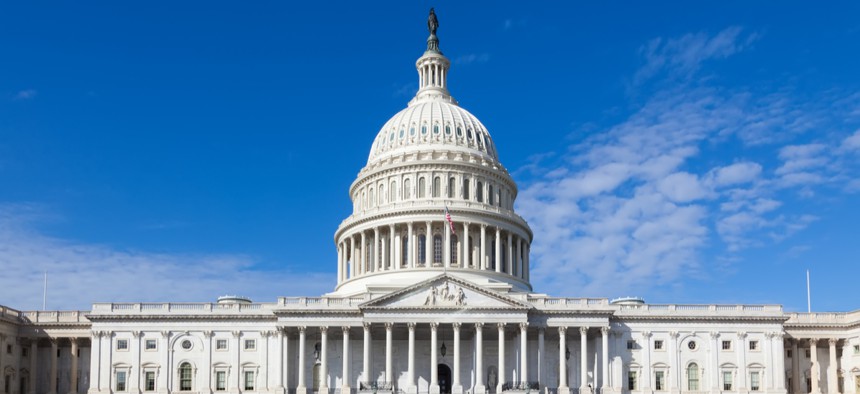Congress Moves to Block OPM-GSA Merger

Evgeniia Ozerkina/Shutterstock.com
A provision in the 2020 National Defense Authorization Act would first require an independent study of the challenges facing the Office of Personnel Management.
The Trump administration’s controversial plan to merge most of the federal government’s HR agency with the General Services Administration appears to have been put on hold, at least for now.
A provision of the latest version of the fiscal 2020 National Defense Authorization Act, the result of weeks of negotiation between both chambers of Congress and the White House, stipulates that the administration cannot move any of the Office of Personnel Management’s functions out of the agency until an independent study of the agency’s responsibilities and challenges has been completed.
In May 2019, the administration formally proposed legislation that would authorize the transfer of most of OPM’s functions to GSA, and move the agency’s policy shop to a division within the Executive Office of the President under the leadership of a non-Senate confirmed political appointee.
But the plan was met with bipartisan skepticism, as Democrats decried the move as an effort to weaken civil service protections and Republicans questioned the lack of analysis preceding the decision. To date, OPM still has not conducted a variety of studies related to the proposal, including analyses of the costs and benefits, as well as whether the agency has the legal authority to transfer any functions administratively, according to an inspector general report released last month.
The NDAA language prevents the transfer of “any function, responsibility, authority, service, system or program that is assigned in law” from OPM to GSA until at least six months after the completion of an independent report on the issue by the National Academy of Public Administration. NAPA will be tasked with examining OPM’s various functions, both statutory and non-statutory, the challenges associated with carrying out those functions, as well as recommending changes to address those challenges.
The NAPA report is expected to consider cost-benefit analyses, feasibility, and the potential impact on labor-management agreements across the federal government, and will be transmitted to the administration, Congress and the public.
The language in the NDAA bill marks a compromise between the White House and House lawmakers. The Trump administration warned that the House-passed NDAA, which also included a provision blocking the merger, was too onerous by blocking the two agencies from entering routine inter-agency agreements, regardless of whether those agreements were related to the proposed merger.
Senior Executives Association Executive Director Jason Briefel said the decision to punt the merger proposal, pending an independent study, represents a good path forward for all parties.
“Given the competing options between the House’s [proposed] restrictions, where some of them were overly onerous, and the absence of Senate language on this issue, this will be helpful, and the study should provide information that’s really been lacking in the debate,” Briefel said. “[The provision] validates the bipartisan concerns that were expressed, ones that many of us in the community care about.”
In a statement, OPM spokesman Anthony Marucci said the agency looks forward to working with NAPA on the study.
"The desired outcome of this study is to give OPM and its stakeholders a view on the potential pathways for the agency's future," Marucci said. "OPM looks forward to working with the United States Congress on assessing those pathways that provide the best outcomes for the American taxpayer."
National Treasury Employees Union National President Tony Reardon said he was pleased Congress agreed to “pump the brakes” on the planned merger.
“NTEU has raised multiple concerns about the administration’s proposals to dismantle the Office of Personnel Management and we are pleased that Congress is planning to require significantly more research and analysis before this il-advised proposal is implemented,” Reardon said. “We strongly oppose giving the White House more power over the civil service because it threatens the merit system upon which our federal workforce is based. We also believe that moving federal retirement services and the Federal Employee Health Benefits Program to the General Services Administration is unwise because the agency has no experience administering such programs.”
The House is slated to vote on the bill later this week, after which the Senate will begin consideration of the measure.
NEXT STORY: 18F gets into defense and intel






